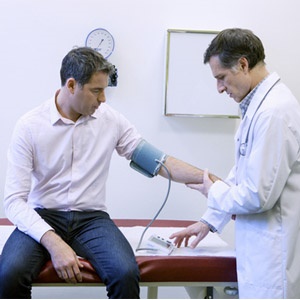
Hypertension is the leading risk factor for disease burden worldwide and the purpose of World Hypertension Day is to promote public awareness of hypertension and to encourage citizens of all countries to prevent and control this modern epidemic.
Aim to reduce cardiovascular disease
It is run by the World Hypertension League which is an affiliate of the International Society of Hypertension. The Heart and Stroke Foundation SA (HSFSA) supports this initiative in our mission to reduce cardiovascular disease in South Africa.
Hypertension, commonly known as high blood pressure or "high-high", is the leading cause of heart attacks and strokes in this country. An estimated 11 million South Africans live with hypertension, and what is even more shocking is that 3 out of 4 people do not even know they are hypertension sufferers.
In a South African population of 54 million where 30% are 15 years and under, it means 30% of the remainder have high blood pressure! It could be you, and the only way to know for sure is to have your blood pressure checked!
Read: What is hypertension?
There are three important steps to beat hypertension: diagnosis, improving your lifestyle and starting treatment until you achieve hypertension control. A recent review shows that South Africans fare dismally in all three of these steps.
Not only are South Africans not aware of their own blood pressure, but most of those who are diagnosed are not on the appropriate treatment, and even less are controlling their blood pressure adequately.
"Sadly, according to a review of a number of studies in sub-Saharan Africa, only 7% of hypertensive patients had controlled blood pressure, which means that 93% of sufferers are at risk of having a heart attack, stroke or developing severe heart disease," says Dr Mungal-Singh, CEO of the HSFSA.
Substantial efforts needed
"These findings indicate we have a ticking time-bomb on our hands. We need substantial efforts to achieve effective prevention and control of hypertension in our country," continued Dr Mungal-Singh.
"I do wish people would take it seriously – perhaps they don’t because it is still a silent condition? Because they have not yet had the heart attack or suffered the stroke…? We want to ensure that people take it seriously before such dire events take place."
Most South Africans are only vaguely aware of the risk factors which contribute to hypertension and therefore cannot identify whether they are at risk.
Read: Treating hypertension
There are a few risk factors beyond our control such as age, family history of hypertension and being diabetic, these already put you at an increased risk of hypertension. Thus it is important to "know your numbers" and manage the risk factors you CAN control.
There are a number of risk factors that you can change for the better. Firstly, eating too much salt can be very harmful. A high salt intake is directly linked to hypertension which puts many South Africans at risk without their knowledge.
The HSFSA encourages all South Africans to manage their salt intake by using this approach: 1) use less salt at home, while cooking and also at the table 2) be aware of how much salt is in foods we buy, and limit eating very salty products like boerewors, polony, salty snacks, stock cubes and soup powders. Also choose foods lower in salt by reading food labels to identify the salt and sodium content.
Key factors driving hypertension
Overweight and obesity are other key factors driving the high rate of hypertension in South Africa. Obesity has become more prevalent in our communities irrespective of socio-economic background.
Inactivity, smoking and drinking too much alcohol further increases the risk of high blood pressure. The good news is that these risk factors are modifiable by simple dietary and lifestyle changes.
"We should all be empowered by knowing what puts us at risk of high blood pressure and then do something about it," says Dr Mungal-Singh. "Hypertension is a ‘silent killer’ and our lifestyles are largely to blame. Yet so many of us are unaware, we simply don’t know how our usual habits can affect us in the long-term. However we can change our lifestyles for the better and prevent hypertension from negatively impacting our lives."
Read: Symptoms of hypertension
Salt Watch member, Prof Krisela Steyn of the The Chronic Disease Initiative for Africa (CDIA) also commented on the importance of salt reduction in our diets: "South Africa has one of the highest rates of high blood pressure worldwide. Many South Africans simply eat too much salt, in fact we eat twice the amount we should – about 11 g per day which is more than double the amount that will reduce one's blood pressure."
A good place to start is by knowing your numbers and avoid becoming a statistic. Get your blood pressure tested at your GP practice, community clinic, nearest pharmacy or venues in the community where the HSFSA are offering free blood pressure testing. Contact the HSFSA for details.
Testing is easy
Peace of mind is as easy as having a blood pressure cuff strapped to your arm, watching it expand and by the time it deflates, you will know your numbers. On World Hypertension Day we ask everybody to get tested, get their family members tested, and remind the people around them to get tested!
Read More:
Black people more prone to hypertension
Treat hypertension to prevent stroke
Heart groups issue updated blood pressure guidelines
Image: Man getting blood pressure checked from Shutterstock




 Publications
Publications
 Partners
Partners














